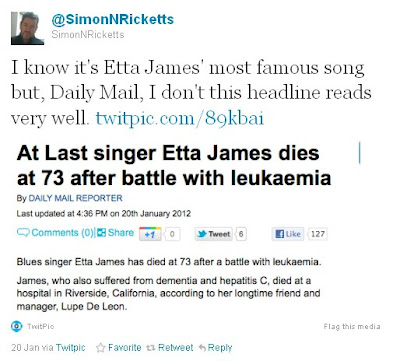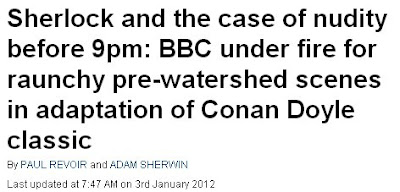Today, the Leveson Inquiry heard from Dawn Neesom, editor of the Daily Star, and Hugh Whittow, editor of the Daily Express.
Neesom asserted:
we write stories to be as accurate as possible.
Regular readers of this blog might find that claim rather surprising. So might Rockstar Games, who the Star accused of planning a Grand Theft Auto game based on Raoul Moat. In their apology for that story,
they admitted:
We made no attempt to check the accuracy of the story before publication and did not contact Rockstar Games prior to publishing the story. We also did not question why a best selling and critically acclaimed fictional games series would choose to base one of their most popular games on this horrifying real crime event.
Neesom was given the front page from 2 June 2011, which carried the headline
'Telly King Cowell is dead'. As we know, Simon Cowell is still alive. Robert Jay QC said
'it's wrong, isn't it?'
Neesom replied:
Um ... it's dramatic. Eye-catching.
She attempted to justify the clearly inaccurate and misleading headline like this:
"Telly king Cowell is dead" in particular was a quote from Gary Barlow, and obviously -- you only have a finite amount of words you can fit on a page 1 as a headline. The subject explains as far as a TV show is concerned, I believe the exact quote was -- and obviously Gary Barlow was only joking, because that's the nature of their relationship -- "As far as we're concerned, Cowell's dead", as far as the show was concerned, and that is explained in the sub-deck and the copy. But yes, it was designed to be an eye-catching headline.
Which might,
might, be fair enough if the headline had been in quote marks and if the quotes she attributed to Gary Barlow in her evidence had actually been said by Gary Barlow. Or, indeed, anyone else.
But the
original article made no such claim. In fact, the word 'dead' appears nowhere other than in the headline. What Barlow had actually said was
'Simon who?' when asked if he had taken any advice about being a judge on
The X Factor.
Jay then asked Neesom about the Star's scaremongering
'Terror as plane hits ash cloud' front page headline of 21 April 2010. This appeared just after planes had started flying again after being grounded because of the ash cloud. Only inside the paper did the Star reveal this was actually a picture - and a story - from a televsion reconstruction of an incident that happened in 1982. Neesom claimed she was unaware that
Gatwick and other airports had removed the paper from newsagent shelves overs fears it could create panic. Three months later,
the Star published an apology. What was Neesom's view of the headline now?
It maybe overegged the pudding and occasionally headlines go too far. Maybe this was one of them.
Yeh. Maybe.
She was also asked about the 7 September 2011 front page headline
'Sex tease Amy get BB boot'. This was one of the Star's many front page headlines about
Celebrity Big Brother and included the sub-head 'Eviction shock for sobbing telly babe'. At the time of the headline, Amy Childs had not been evicted from, or booted out of, the
Celebrity Big Brother house.
Was this another bit of 'overegging'? Maybe, but Neesom's memory had suddenly gone blank:
I honestly don't remember this story, I'm sorry. I don't know what the "boot" refers to. It could have been from The Only Way is Essex, from her agency. I'm not familiar with the story, I'm sorry.
In fact, it couldn't have been from
The Only Way is Essex - she left that programme to appear on
Celebrity Big Brother. In any case, the wording of the headline was pretty clear.
Jay persisted:
Q. ...it is being suggested that the boot is the eviction from Big Brother, isn't it?
A. As I say, I'm not familiar with this story, so I don't know.
Jay questioned Neesom about another front page headline:
'Muslim thugs age just 12 in knife attack on Brit schoolboy'. Her response?
I must confess I am not familiar with this particular story.
Part of the problem with this headline was that there wasn't a 'knife attack' but threats made on Facebook. Jay asked:
Q. ...but the wording "Muslim thugs aged just 12 in knife attack", that does suggest to one objective reader, at least, that there was a physical attack on whom you describe as a Brit school --
A. Yes, I agree it could be interpreted that way.
Q. Could be or could only be interpreted in that way?
A. I said I'm not familiar with this story and I didn't write the headlines, so ...
Q. Again, it's the tendentious language. The Muslim thugs are British, yet it's the "Brit schoolboy". So you have the very uncomfortable juxtaposition and a tendentious message you're transmitting, would you accept?
A. I think it could be interpreted that way. As I said, I'm really not familiar with this story, which is a bit frustrating.
Q. You're resisting, or you're entitled to resist, the interpretation I'm putting on it, but it might be said that you are overresisting an interpretation which is the only interpretation you could fairly put on this story; wouldn't you agree?
A. I think -- yes, you can interpret it in the way you've interpreted it, and obviously people have done, you know, for which is -- you know, is not good.
Q. It's not good, but what, if anything, is being done about it to address this bias, Ms Neesom? Because you're the editor, you're the person responsible for this sort of message.
A. Yes, absolutely. We are not biased against Muslims.
This may seem a questionable claim from a paper that has published front page headlines such as
'BBC puts Muslims before YOU!' and
'Christmas 'nicked' by Muslims' - among
many other stories. When pushed on some of her paper's coverage of Islam, she maintained:
We do have a balanced agenda.
This from the editor of the paper that was
told off by the PCC for their untrue 'Muslim-only public loos' front page. She promised to provide the Inquiry with examples of this
'balanced agenda'. Whether that file will include a copy of the
scrapped-at-the-last-minute Daily Fatwa page remains to be seen.
But what, overall, is Neesom's view on the headlines on the front page of her paper?
The nature of the Daily Star is we are a very young tabloid newspaper. We don't have historic readership, we don't have subscription, we don't have home delivery. We do rely on people picking up the newspaper off the news stands, which is why our front pages have to be as eye-catching as we can make them.
Those who remember the
disgraceful 'I know who killed Jo Yeates' front page - based on the (incorrect) claims of a psychic - will know
'eye-catching' very often seems a far more important consideration that accuracy.
And what about the stories?
I think the Daily Star has a certain style of writing that appeals to the readers and stories are written in the way we know appeals to the readers.
Jay asked, in response to that:
Q. There might be a kernel of truth in the story, but in order to make it more appetising and entertaining to its readers, which obviously you are plugged into you spin, embroider and weave around the edges of the story. Does that happen?
A. It's -- I wouldn't quite put it in those words, but as I say, it's written in a style that we know works for our readers.
That wasn't a 'no'.
After Neesom, Express editor Hugh Whittow gave evidence. He was asked about the Express' blatantly untrue
'Salt banned in chip shops' front page headline. Despite lots of huffing and puffing about rigorously enforced 'diktats' in the story and editorial, there was no such ban.
Jay asked:
Q. Is this right: three chip shops in Stockport took part in a voluntary trial scheme in which extra salt was left behind the counter rather than on it?
A. Yes.
Q. The headline suggested that there was a ban and that it was wide scale, when it was neither; is that correct?
A. It says so: ban in chip shops. So there were three shops and it was an experiment and it would have been -- it would spread out if it was successful or not. It was a good story, everybody was talking about it. Salt in the diet is always an issue, isn't it?
Q. I think the point is that there wasn't in fact a ban. The extra salt was left behind the counter rather than on it --
A. I -- I accept that.
So he accepted, eventually, the headline and thrust of the article was wrong. But it was still
'a good story'.
Whittow added:
I'm not going to say it's the most important story in the world, but it's certainly a talker.
Jay replied, witheringly:
It's certainly not the most important story in the world, but it's found its way to the front page of the Daily Express.
Jay then asked him about another untrue Express headline, this one from 22 October 2011, which stated:
'75% say: 'Quit the EU now''. Deliberately inflated to fit the paper's anti-EU agenda, the 75% figure was made up of 28% saying quit and 47% saying renegotiate. Jay explained those figures and asked if the headline was, therefore, misleading. Whittow replied:
I accept that from what you say.
Both of these admissions from Whittow came just after he told the Inquiry:
we don't twist anything. We just present the news of the day.
Evidence of the Express
'twisting' things -
especially on Europe - is
not hard to find.
But perhaps Whittow's 'finest moment' came when he was asked about the decision of the Express and Star titles to withdraw from the PCC. Jay asked:
Q. So is this right: your feeling is that it was right to leave the PCC because the PCC let you down in failing to stop your paper publishing defamatory articles about the McCanns; is that your evidence?
A. That's one of the reasons, yes.












